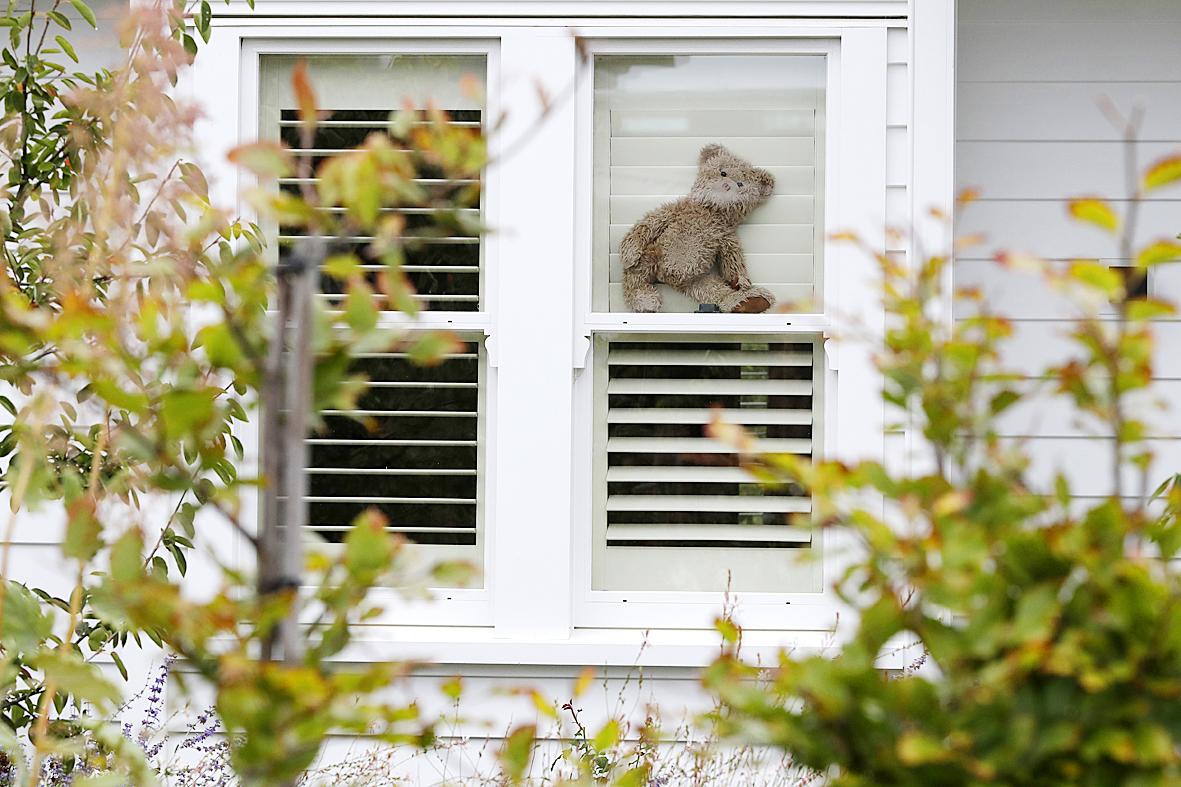Teddy bears are popping up in the unlikeliest of places as New Zealanders embrace an international movement in which people in lockdown are placing the stuffed animals in their windows to brighten the mood and give children the game of spotting bears in their neighborhoods.
The inspiration comes from the children’s book We’re Going on a Bear Hunt, written by Michael Rosen and illustrated by Helen Oxenbury.
New Zealand last week began a four-week lockdown, but people are still allowed outside to exercise if they keep a safe distance from each other. In other words, bear-spotting is permitted.

Photo: AP
Deb Hoffman, part-time school administrator and mother of two, started a Facebook page called “We’re Not Scared — NZ Bear Hunt” and also set up a Web site with an online map, on which more than 120,000 people have placed pins to show the location of their bears.
“We’re not scared” is a repeated line in the book, which features a family overcoming a number of obstacles in their search for a bear.
Hoffman said that she has been taken aback by the huge response, adding that some people are creating personalities for their bears by having them do a different activity each day.
One woman, who had been housebound for six weeks following surgery before the lockdown began, wrote that the teddy bears were the only thing getting her through the isolation, Hoffman said.
New Zealand Prime Minister Jacinda Ardern has even joined in, saying that people should keep an eye on her window because they might spot a bear.
In recent weeks, the 73-year-old author has wondered on Twitter whether symptoms including fatigue and fever meant that he had COVID-19 or a “heavy flu.”
Rosen’s family on Tuesday said that he was doing “poorly,” but improving, having previously spent a night in intensive care.

The collapse of the Swiss Birch glacier serves as a chilling warning of the escalating dangers faced by communities worldwide living under the shadow of fragile ice, particularly in Asia, experts said. Footage of the collapse on Wednesday showed a huge cloud of ice and rubble hurtling down the mountainside into the hamlet of Blatten. Swiss Development Cooperation disaster risk reduction adviser Ali Neumann said that while the role of climate change in the case of Blatten “still needs to be investigated,” the wider impacts were clear on the cryosphere — the part of the world covered by frozen water. “Climate change and

Packed crowds in India celebrating their cricket team’s victory ended in a deadly stampede on Wednesday, with 11 mainly young fans crushed to death, the local state’s chief minister said. Joyous cricket fans had come out to celebrate and welcome home their heroes, Royal Challengers Bengaluru, after they beat Punjab Kings in a roller-coaster Indian Premier League (IPL) cricket final on Tuesday night. However, the euphoria of the vast crowds in the southern tech city of Bengaluru ended in disaster, with Indian Prime Minister Narendra calling it “absolutely heartrending.” Karnataka Chief Minister Siddaramaiah said most of the deceased are young, with 11 dead

Poland is set to hold a presidential runoff election today between two candidates offering starkly different visions for the country’s future. The winner would succeed Polish President Andrzej Duda, a conservative who is finishing his second and final term. The outcome would determine whether Poland embraces a nationalist populist trajectory or pivots more fully toward liberal, pro-European policies. An exit poll by Ipsos would be released when polls close today at 9pm local time, with a margin of error of plus or minus 2 percentage points. Final results are expected tomorrow. Whoever wins can be expected to either help or hinder the

DENIAL: Musk said that the ‘New York Times was lying their ass off,’ after it reported he used so much drugs that he developed bladder problems Elon Musk on Saturday denied a report that he used ketamine and other drugs extensively last year on the US presidential campaign trail. The New York Times on Friday reported that the billionaire adviser to US President Donald Trump used so much ketamine, a powerful anesthetic, that he developed bladder problems. The newspaper said the world’s richest person also took ecstasy and mushrooms, and traveled with a pill box last year, adding that it was not known whether Musk also took drugs while heading the so-called US Department of Government Efficiency (DOGE) after Trump took power in January. In a